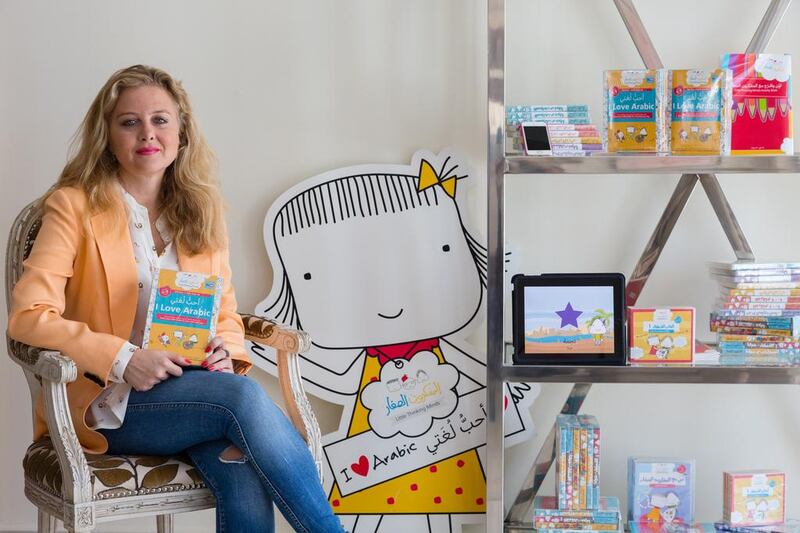A lack of Arabic language learning tools for children was the catalyst for Lamia Tabbaa-Bibi to set up a business.
The realisation came in 2004, when Ms Tabbaa-Bibi, a Saudi Arabian, gave birth to her son Hamid in London, where she was living at the time.
But it was not only the lack of educational aids in a foreign country that concerned her. She also believed there was a gap in the market for children living in the Middle East.
“I wanted Hamid to learn Arabic and I searched for Arabic-speaking products, which I didn’t find in the market,” says Ms Tabbaa-Bibi. So with a degree in media production and a background in television, she decided to create her own.
The same year, she approached Rama Kayyali Jardaneh in Amman, also a young mother, to be her business partner with the proposition to make educational movies for children.
Their company Little Thinking Minds was born in 2005 with a DVD called Animals Around Us. Two years ago it launched digital downloads with mobile applications coming a year later. It also produces CDs, activity books, flash cards and online games.
The company is among a handful that teaches Arabic to children in the Middle East in a burgeoning market for international private schools. Its entertainment and educational products have their biggest market in Saudi Arabia and the founders are working on products for schools that it plans to pilot in December in Dubai.
Conflict and poverty hamper early childhood learning programmes in the Middle East, according to the World Bank. But even among the richer countries in the Gulf, which has invested in preschool education, such programmes often do not achieve the goals.
“The quality of educational systems beginning with early childhood services is not sufficient and too low to attain the intended learning outcomes,” it said in a report in 2010.
Little Thinking Minds is registered in Amman, where it is run by Ms Kayyali Jardaneh, the general manager, and Ms Tabbaa-Bibi oversees business development and content creation from Dubai, where she moved to six years ago.
“Children’s knowledge of the Arabic language is poor as there is little immersion in the language,” Ms Tabbaa-Bibi, 40, says. “When they look around nobody is speaking the language, as a result children don’t get that immersive experience. Also, there is a big discrepancy between spoken Arabic and written Arabic. There is only a 40 per cent overlap in the vocabulary used in classical and colloquial Arabic, and their vocabulary is never really rich because of the discrepancy.”
Little Thinking Minds’ Arabic educational audio-visual content targets children under the age of seven to teach them preschool fundamentals in Arabic. “The window for language aptitude is young,” she says. “And most children in the internet age can use apps on their own,” Ms Tabbaa-Bibi says.
Products are sold off-line in 10 countries through retail outlets, bookshops, play areas and mega stores, as well as online through its website and partner websites. Digitally, it is available via YouTube rentals, iTunes, digital downloads and the Apple Store.
"When we started, the bulk of our sales were physical sales to whole-sellers, retailers and distributors, but now it is shifting to digital," she says. The US is the biggest market when it comes to downloading its apps.
The company was incubated at Oasis500, an Amman-based incubator for 90 days, in 2010 and closed its first round of funding in January last year, raising US$230,000. The money was used to hire new staff and the company now has a core team of four. It closed its second round of fund-raising this month and raised another $150,000 to hire more employees in the production department such as a videographer and an editor.
Little Thinking Minds now has nine DVD titles – with two released this year – retailing at Dh55, and expects to start generating profit next year.
While the tools are targeted at Arabic families, these can be used by non-Arabic speaking parents to teach Arabic fundamentals to their children.
The various dialects of the language across the Middle East – from the French-infused dialects in east Magreb to those prevalent in the Gulf – mean the content writers are mostly restricted to classical Arabic.
“We are yet to customise the content according to different regions because our idea is to unify the language,” Ms Tabbaa-Bibi says.
ssahoo@thenational.ae
Follow us on Twitter @Ind_Insights





